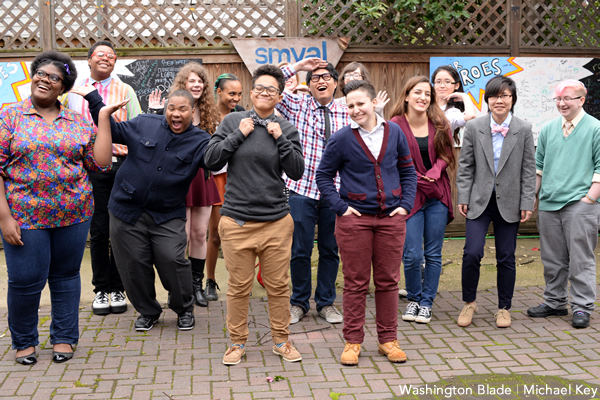a&e features
Young and proud
20 youths reflect on coming out early and misconceptions about millennials
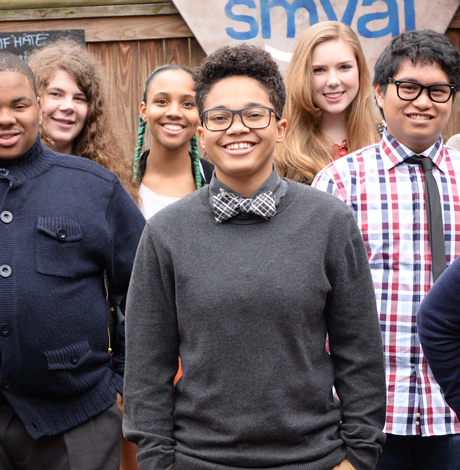
Youth Pride will be here soon. LGBT young people from all over the D.C. area will spend Saturday, May 2 from noon-5 p.m. in Dupont Circle enjoying performances, games, speakers, testimonials and more (details at youthpridealliance.org).
To celebrate this year’s event, Washington Blade staff teamed up with SMYAL to profile 20 local youths 20 and under. Their perspectives encompass the full range of queer teen experience from bullying and harassment to acceptance and joy.
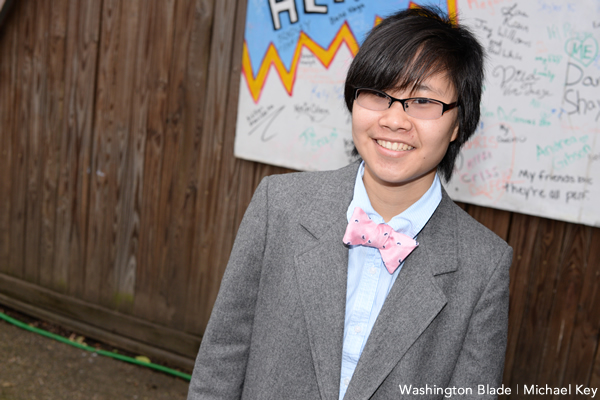
Carolyn Kidd (Washington Blade photo by Michael Key)
NAME: Carolyn Kidd
AGE: 20
RESIDENCE: Maryland
ID AS: genderqueer/queer
CAME OUT: senior year of high school
1. What kind of reaction have you received being out at school?
The reaction of my peers has mostly been positive. However when I attended Duquesne University, a Catholic university in Pittsburgh, I experienced bigotry and “aversion” to “the gay lifestyle.” At St. Mary’s College of Maryland, I experienced a kind of gay euphoria and was accepted … and was able to start a club for trans students.
2. How have your family, friends and community reacted?
My family and friends reacted positively, however my parents were concerned about how being out would impact my future.
3. Have there been any benefits/downsides to being out?
There have been no overt downsides to being out, but hearing people openly badmouth the LGBT community is hard.
4. What’s been the hardest or best part of being out?
The hardest is constantly being misgendered whether it’s being called “sir,” “young lady” or using the wrong pronouns.
5. Did you go to Youth Pride last year?
No
6. What is the biggest misconception LGBT Boomers and Gen Xers have about LGBT Millennials?
That trans people are cross dressers and confused. Trans folks are often excluded.
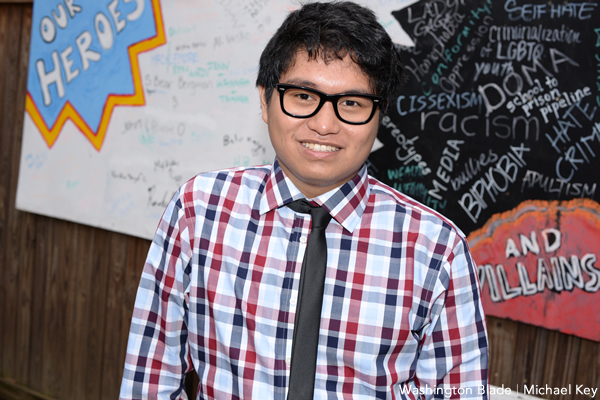
Jason Adle (Washington Blade photo by Michael Key)
NAME: Jason Adle
AGE: 16
RESIDENCE: Gaithersburg, Md.
ID AS: gay
CAME OUT: 2010-ish
1. What kind of reaction have you received being out at school?
The reaction at school has been neutral at worst and encouraging at best. For the most part, encouraging and supportive.
2. How have your family, friends and community reacted?
By and large, supportive and positive.
3. Have there been any benefits/downsides to being out?
The main benefit is that there is no stress to not be yourself. You can be you to the Nth degree.
4. What’s been the hardest or best part of being out?
The worst part is having to deal with those who you did not want to know your identity at a certain time. But on the flip side, it is absolutely great not having to feel trapped in being something you’re not.
5. Did you go to Youth Pride last year?
I did. It was a great time to hang out with friends and meet new people and learn about/interact with organizations that were helping further the cause.
6. What is the biggest misconception LGBT Boomers and Gen Xers have about LGBT Millennials?
I think the biggest disconnect is how aware Millennials appear to be in regard to LGBT history. We may not have lived in certain parts of LGBT history, but we are well aware of the events that have led to today.
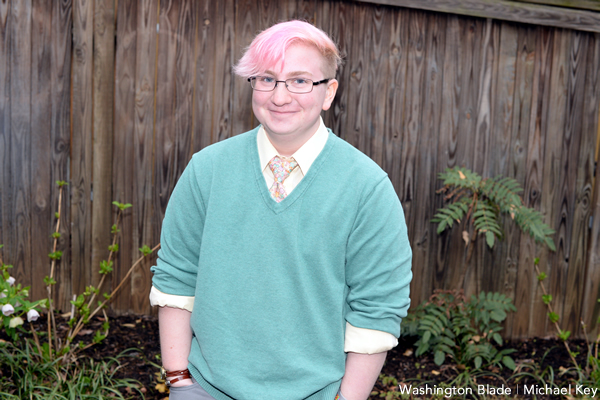
Azariah Kurlantzick (Washington Blade photo by Michael Key.
NAME: Azariah Kurlantzick
AGE: 17
RESIDENCE: Potomac, Md.
ID AS: queer/trans boy
CAME OUT: May 2011 as bi (in seventh grade); summer 2012 as transgender, just before ninth grade
1. What kind of reaction have you received being out at school?
When I first came out as bi, I was attending a Jewish day school so it was sometimes weird for me when taking part in class discussions on whether homosexuality is a sin, but reactions were generally fine. I was still at that school when I came out as transgender and I did encounter some people who refused to use my new name and pronouns, but with the help of Keshet, a Jewish LGBT organization, I was met with support.
2. How have your family, friends and community reacted?
My family and friends have been very accepting and although my Jewish community had a bad reaction initially, it has become more positive. Now that I’m attending public school for the first time in 11th grade, I hear a lot of homophobic slurs directed at me in class and in the halls, but whenever I talk to people, they seem accepting.
3. Have there been any benefits/downsides to being out?
A big benefit of being out is that I feel more comfortable now exploring my gender presentation. Before, I felt the need to present as very masculine so that people might read me as a girl. Now, though, I feel more comfortable doing things like dying my hair pink because I can assume that most people do not see me as a girl.
4. What’s been the hardest or best part of being out?
The best part is that I am now part of a wonderful community that I wouldn’t have access to were I still in the closet.
5. Did you go to Youth Pride last year?
It was a good event, but adults there kept referring to the trans people I was with as ladies.
6. What is the biggest misconception LGBT Boomers and Gen Xers have about LGBT Millennials?
That there are fewer of us than there actually are and that all of us are cisgender.
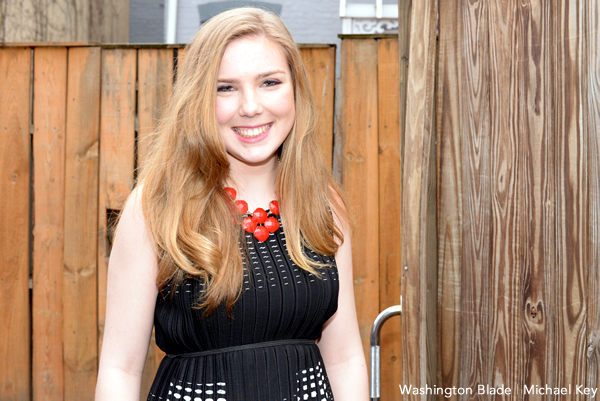
Carly Carter (Washington Blade photo by Michael Key)
NAME: Carly Carter
AGE: 18
RESIDENCE: Herndon, Va.
ID AS: lesbian/queer
CAME OUT: March 26, 2014
1. What kind of reaction have you received being out at school?
Not a huge one. People were surprised but otherwise I didn’t get a lot of response. Occasionally, I hear a mean comment, but usually people are really supportive.
2. How have your family, friends and community reacted?
My friends are great! I could not have picked better friends. Most of us are queer actually, so that works out great. My mom and dad are still adjusting. … they have overall been crazy supportive. Not a mean word has ever come out of their mouths.
3. Have there been any benefits/downsides to being out?
Getting to be more open and honest with people is a huge plus. Also meeting a bunch of queer friends whom I love being in touch with. I would never have met them had I not been out.
4. What’s been the hardest or best part of being out?
There are challenges with everything — being out is not an exception.
5. Did you go to Youth Pride last year?
No, I didn’t know about it.
6. What is the biggest misconception LGBT Boomers and Gen Xers have about LGBT Millennials?
That we have it easy or that the hardships they had to face are gone now.
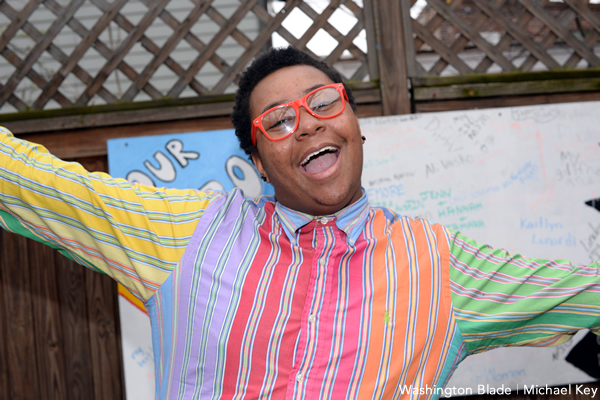
Autumn Smith (Washington Blade photo by Michael Key)
NAME: Autumn Smith
AGE: 18
RESIDENCE: D.C.
ID AS: male
CAME OUT: 2013
1. What kind of reaction have you received being out at school?
That I was “cool for being a gay guy” except when I wore women’s jewelry.
2. How have your family, friends and community reacted?
My family doesn’t talk about it. Friends are cool and it’s all good until I wear a dress.
3. Have there been any benefits/downsides to being out?
Oh yes!
4. What’s been the hardest or best part of being out?
Harassment, weird looks.
5. Did you go to Youth Pride last year?
Yes! It was amazing as always.
6. What is the biggest misconception LGBT Boomers and Gen Xers have about LGBT Millennials?
That our struggles can’t compare with theirs.
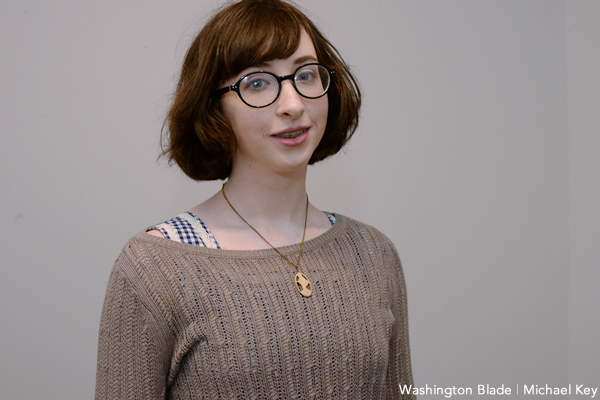
LC (Washington Blade photo by Michael Key)
NAME: LC (Lauren Collins)
AGE: 16
RESIDENCE: Herndon, Va.
ID AS: bisexual
CAME OUT: eighth grade
1. What kind of reaction have you received being out at school?
Mixed — positive from close friends, but neutral to negative from the student body.
2. How have your family, friends and community reacted?
Mom has come around and is supportive now. Dad said a couple insensitive things but he’s always supported me. My church and community are pretty OK with it.
3. Have there been any benefits/downsides to being out?
Being able to interact with openly queer friends and being able to share my relationships publicly. Downsides are backlash at school and it’s harder to fly under the radar.
4. What’s been the hardest or best part of being out?
Feeling like a representative for all queer people.
5. Did you go to Youth Pride last year?
N/A
6. What is the biggest misconception LGBT Boomers and Gen Xers have about LGBT Millennials?
That we’re just “confused” or saying we’re queer or trans just because it’s “trendy.”
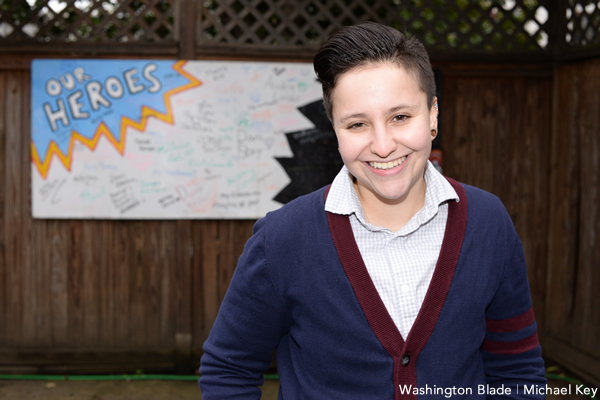
Katie Barack (Washington Blade photo by Michael Key)
NAME: Katie Barack
AGE: 19
RESIDENCE: McLean, Va.
ID AS: queer
CAME OUT: April 2013
1. What kind of reaction have you received being out at school?
I’ve been accepted by the community as someone who could fall in love with someone of any gender. However, I go to a “same-sex” boarding school, so all of my gender questioning has been pretty private. I’ve had to give a lot of advice to underclassmen. I love the leadership role and being the only out student has made me find an incredible community.
2. How have your family, friends and community reacted?
My family is very supportive. While my friends at school are supportive, my friends from home in the Midwest can be very ignorant and tend to make me feel “other.”
3. Have there been any benefits/downsides to being out?
I feel excluded often and school dances are awkward. In my tux, I’m called “sharp” while all the other students in dresses are called “gorgeous.”
4. What’s been the hardest or best part of being out?
I’ve found a community I would never trade. I love finding other queer people. Questioning my gender is something I’ve only recently come out about. It sucks that my high school diploma probably won’t have the name I use on it. I wish I could use the right pronouns and name, but I’m at an all-girls school. I’ve had to work my ass off to get us to be aware of transgender students and the need for accommodating policies.
5. Did you go to Youth Pride last year?
No
6. What is the biggest misconception LGBT Boomers and Gen Xers have about LGBT Millennials?
Transgender people are viewed as outsiders of the community by the older generation. Cultural intersectionality is ignored.
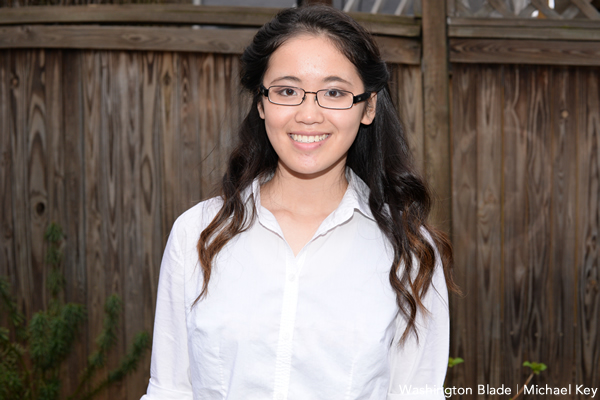
Lia Warner (Washington Blade photo by Michael Key)
NAME: Lia Warner
AGE: 16
RESIDENCE: Chesapeake, Va.
ID AS: lesbian
CAME OUT: 14
1. What kind of reaction have you received being out at school?
I was really lucky to be a member of a very accepting track and cross-country team, so in the locker room, I felt a lot safer than I anticipated. But I still heard homophobic slurs and comments elsewhere at school.
2. How have your family, friends and community reacted?
My parents have been overwhelmingly supportive as have my friends. Many members of the community as well, but that’s not to say it’s been 100 percent positive.
3. Have there been any benefits/downsides to being out?
A benefit would be, of course, the ability to be myself and be true to my identity with those I love. The downside, where I live is overwhelmingly homophobic and discriminatory.
4. What’s been the hardest or best part of being out?
The hardest — when people look at me in a different and negative light. The best — my ability to be myself publicly and help others in my GSA.
5. Did you go to Youth Pride last year?
No, I did not know about SMYAL or that event. I did go to Hampton Roads Pride, which was fabulous.
6. What is the biggest misconception LGBT Boomers and Gen Xers have about LGBT Millennials?
They believe this is a phase or that we’re somehow a mistake.
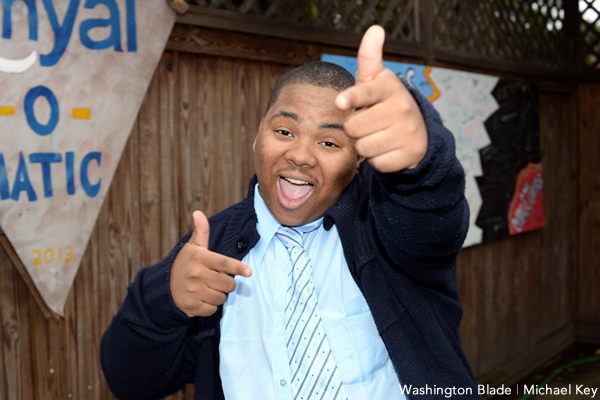
Rico Jones (Washington Blade photo by Michael Key)
NAME: Rico Jones
AGE: 15
RESIDENCE: none given
ID AS: bisexual
CAME OUT: This year
1. What kind of reaction have you received being out at school?
Mixed — happiness from some who were proud of me, but also a lot of bullying most of the time. I’ve been called a lot of names and picked on by many others.
2. How have your family, friends and community reacted?
My friends were all by my side and have wished me happiness and the best of luck.
3. Have there been any benefits/downsides to being out?
Benefits: happy to have found myself in so many ways, love and freedom. Downsides: bullying.
4. What’s been the hardest or best part of being out?
Bullying and the feeling that people think because you’re gay, you think you deserve special rights or treatment.
5. Did you go to Youth Pride last year?
No, I wish I had.
6. What is the biggest misconception LGBT Boomers and Gen Xers have about LGBT Millennials?
Being myself and being free and showing other people that we can be the change.
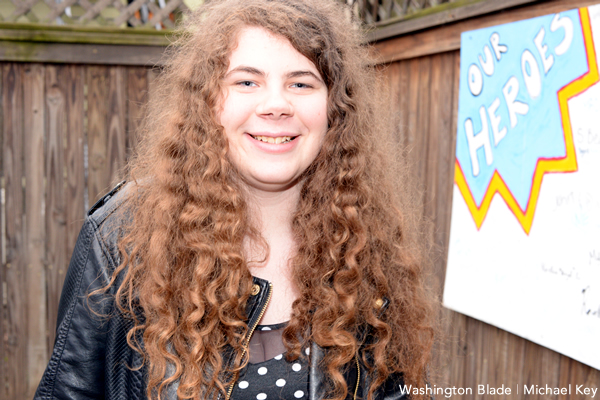
Sasha Jarvis (Washington Blade photo by Michael Key)
NAME: Sasha Jarvis
AGE: 18
RESIDENCE: Derwood, Md.
ID AS: bisexual
CAME OUT: ninth grade
1. What kind of reaction have you received being out at school?
Neutral
2. How have your family, friends and community reacted?
I’ve had a pretty positive reaction. The first person I came out to was my friend Kathryn and it felt so nice until she decided she had to tell her mom. So that was super uncomfortable because I wasn’t even out to my own parents. My favorite thing was when I casually dropped the word “girlfriend” without getting any kind of extreme response. That was affirming.
3. Have there been any benefits/downsides to being out?
I haven’t really felt any downsides personally but it is rewarding to not be sitting quietly and letting homophobes slide out of fear of judgment.
4. What’s been the hardest or best part of being out?
It’s annoying to hear hetero-normative language from people close to me. Like hearing my mom say my sisters and I should live alone or with a girlfriend (as in a female friend) before getting married. It hurts to not have my identity respected, even in small ways.
5. Did you go to Youth Pride last year?
Yes! I love being able to share my queer community life with my school friends.
6. What is the biggest misconception LGBT Boomers and Gen Xers have about LGBT Millennials?
I think the biggest misconception is that we’re all just following trends.
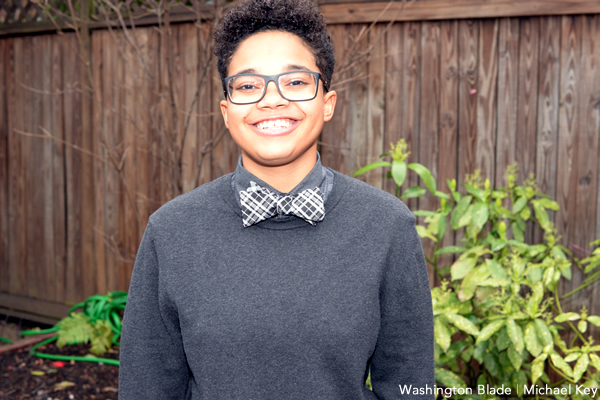
Gavin Calvin (Washington Blade photo by Michael Key)
NAME: Gavin Calvin
AGE: 16
RESIDENCE: Clarksburg, Md.
ID AS: transgender
CAME OUT: 8th grade
1. What kind of reaction have you received being out at school?
Very supportive and loving.
2. How have your family, friends and community reacted?
They were not surprised and supported me fully.
3. Have there been any benefits/downsides to being out?
Strangers not understanding my choices and judging.
4. What’s been the hardest or best part of being out?
I’m more comfortable around my peers and am happier living as who I truly am.
5. Did you go to Youth Pride last year?
No
6. What is the biggest misconception LGBT Boomers and Gen Xers have about LGBT Millennials?
(My generation) seems to think LGBT Boomers are reckless and carefree. My experience with Gen. Xers is that they think how we are is a choice and is wrong.
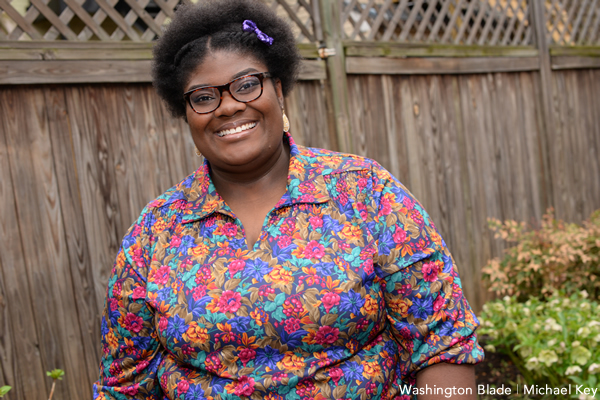
Erika Johnson (Washington Blade photo by Michael Key)
NAME: Erika Johnson
AGE: 18
RESIDENCE: Clinton, Md.
ID AS: lesbian
CAME OUT: 9th grade
1. What kind of reaction have you received being out at school?
I received a pretty positive reaction from my friends and teachers. A lot of my friends were shocked and surprised but very supportive.
2. How have your family, friends and community reacted?
My family on the other hand, doesn’t really understand. Most of them don’t know I’m out, but the few I trust fully support.
3. Have there been any benefits/downsides to being out?
The benefit of being out is that there are so many people I can relate to on a personal level. Being out has given me the spunk to go forth with my advocacy. The downside of being out is that not a lot of people fully understand my new points. Coming out in the ninth grade has been very stressful because I still feel like I’m hiding.
4. What’s been the hardest or best part of being out?
The hardest part about being out is that it is hard trying to express myself in front of people. I’m partially in the closet and partially not. The best part is that I can come to SMYAL and feel like the true me. SMYAL has made this process 100 percent easier. There are still some obstacles I have to get over, but I am a strong woman who can do anything.
5. Did you go to Youth Pride last year?
Yes! It was amazing. It was a pleasure meeting more SMYAL folks and getting to learn about queer youth experiences.
6. What is the biggest misconception LGBT Boomers and Gen Xers have about LGBT Millennials?
That we spend too much time “complaining” about what we need when we are really just speaking the truth.
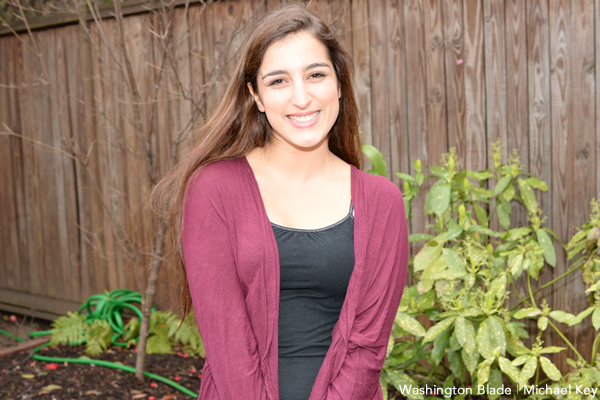
Selvi Ulusan (Washington Blade photo by Michael Key)
NAME: Selvi Ulusan
AGE: 16
RESIDENCE: Bethesda, Md.
ID AS: queer/bi
CAME OUT: June 20, 2013
1. What kind of reaction have you received being out at school?
Surprise mostly. I don’t think everyone knows quite yet actually. I don’t tell everyone I meet automatically but if anyone asks, I tell them the truth.
2. How have your family, friends and community reacted?
My friends were very supportive. My family kind of already saw it coming but my little sister was great. So nice!
3. Have there been any benefits/downsides to being out?
Benefits: I am who I am and people knowing doesn’t change that, but they just know a little bit more about me. Downsides: there was a lot of “are you sure?” or just “weirded out” reactions. Some people just didn’t believe me, but that’s not my problem.
4. What’s been the hardest or best part of being out?
Hardest: That I feel like I have to keep coming out every time I tell someone else. Best is letting people know a little more of who I am.
5. Did you go to Youth Pride last year?
I have been to the Capital Pride parade and festival the last two years, but not Youth Pride. The first year I went to Pride, it was amazing. I met a girl who made all of my unanswered questions about myself incredibly clear.
6. What is the biggest misconception LGBT Boomers and Gen Xers have about LGBT Millennials?
That it’s just a choice or just how you feel and that you can only be attracted to one gender.
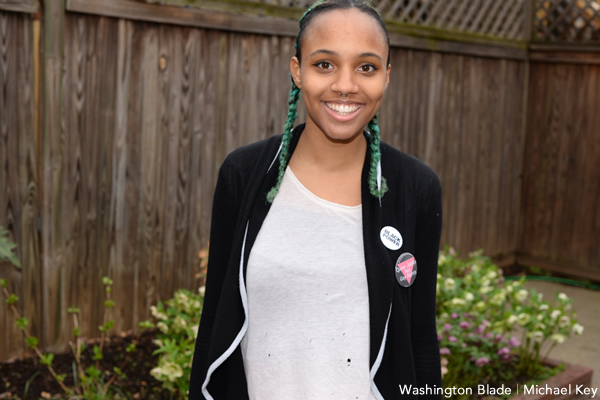
Temitayo Wolff (Washington Blade photo by Michael Key)
NAME: Temitayo Wolff
AGE: 18
RESIDENCE: D.C.
ID AS: queer girl (panromantic, grey-asexual)
CAME OUT: beginning of 11th grade/end of 2013
1. What kind of reaction have you received being out at school?
Within a specific community, I’ve received so much love and support. My friend group is super gay. I haven’t received much open hostility. Some people have a lot of questions.
2. How have your family, friends and community reacted?
My mom wishes I would stop saying words like “pansexual,” which she never heard. I think she accepts my identity even though it doesn’t make sense to her. My dad is also a little confused but he is supportive of my identity, activism and presentation. I have a much younger sister and I think coming out has made her more accepting and socially aware.
3. Have there been any benefits/downsides to being out?
I’ve been really lucky to experience more benefits than downsides when I came out. Coming out provided me with a community of really supportive queer friends online and in D.C. The main downside is tension with my mother.
4. What’s been the hardest or best part of being out?
The best — my queer-platonic partner and my girlfriend.
5. Did you go to Youth Pride last year?
I did attend and had a lot of fun. I appreciate Youth Pride as a space that doesn’t have alcohol and nearly as many people as Capital Pride. However a lot of my friends were consistently misgendered both by peers and by adults who were running the programs, which was disappointing that an event that is supposed to be safe for trans people makes assumptions about people’s gender and reinforces that non-existent binary.
6. What is the biggest misconception LGBT Boomers and Gen Xers have about LGBT Millennials?
I think older folks feel like we are undermining a lot of the work they did with our own activism. When we use social media as a platform for advocacy, they think we are being lazy or unproductive. When we reclaim “queer” as a self-identifier, they think we are disrespecting their struggle to eliminate the use of that word. When we advocate for lesser-known identities like asexuality, pansexuality and non-binary genders, they think we are just making up new words and new forms of oppression when they fought so hard just for basic recognition of the L, G, B and T. I think older LGBTQ folks need to recognize that queer young people of color exist.
NAME: Lance M. Coates III (Lacyy Coates)
AGE: 20
RESIDENCE: D.C.
ID AS: trans woman, early transition stage
CAME OUT: 16
1. What kind of reaction have you received being out at school?
I have received mixed reactions at various schools.
2. How have your family, friends and community reacted?
My family and friends have been supportive while the community as a whole has been very hostile to the point of gay bashing.
3. Have there been any benefits/downsides to being out?
I have become more inspired to live my life openly by the girls at Casa Ruby.
4. What’s been the hardest or best part of being out?
Being able to be myself is the best part.
5. Did you go to Youth Pride last year?
Yes, it was a very happy experience.
6. What is the biggest misconception LGBT Boomers and Gen Xers have about LGBT Millennials?
They don’t really interact with us or teach us the ways.
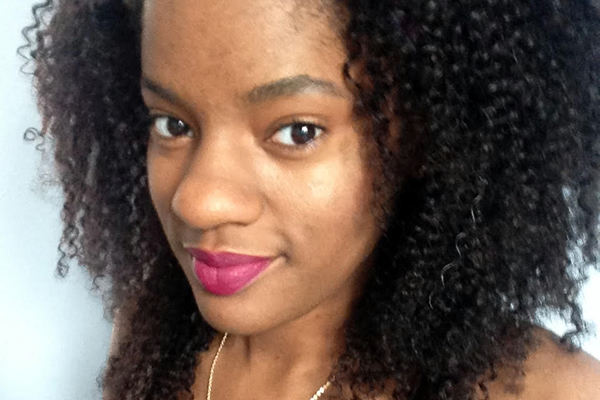
Ebony Rempson (Photo courtesy of Ebony Rempson)
NAME: Ebony Rempson
AGE: 20
RESIDENCE: D.C.
ID AS: queer
CAME OUT: 2009
1. What kind of reaction have you received being out at school?
In high school, it varied from shock and disgust to understanding.
2. How have your family, friends and community reacted?
I had problems with my family at first, especially since I was outed by a family member but things got better. My friends have always been loving. Communities that I’ve found myself a part of have been great support systems and always served as places where I could seek validation.
3. Have there been any benefits/downsides to being out?
I wouldn’t have had a chance to grow the way I did and share my unique story with people had I not been out.
4. What’s been the hardest or best part of being out?
The hardest part about being out as queer has been knowing that there is a third strike against me in the heteronormative and patriarchal society, strikes one and two being black and a woman.
5. Did you go to Youth Pride last year?
Yes and it’s always positive. There’s nothing better than a sense of community.
6. What is the biggest misconception LGBT Boomers and Gen Xers have about LGBT Millennials?
That we’re lazy and self absorbed.
NAME: Shantel Jordan
AGE: 17
RESIDENCE: Arlington, Va.
ID AS: queer/trans
CAME OUT: 2013
1. What kind of reaction have you received being out at school?
My close friends were very supportive. Some other students didn’t understand and made some pretty harsh comments.
2. How have your family, friends and community reacted?
Family was mixed — they were upset at first, but are now mostly supportive.
3. Have there been any benefits/downsides to being out?
The big benefit is being able to be myself. It’s very refreshing not to have to hide.
4. What’s been the hardest or best part of being out?
Hearing from people that God doesn’t like gay people. That was hard.
5. Did you go to Youth Pride last year?
I did. I enjoyed it.
6. What is the biggest misconception LGBT Boomers and Gen Xers have about LGBT Millennials?
That we just want to play on our phones and aren’t really serious about anything.
NAME: James Rosenstein
AGE: 15
RESIDENCE: Arlington, Va.
ID AS: queer
CAME OUT: 2014
1. What kind of reaction have you received being out at school?
I had a number of people ask if I really thought I was gay or if it was a phase but most of my friends were great. They really accept me for me.
2. How have your family, friends and community reacted?
My family has been really great. They wanted to talk a lot when I first told them, but they have always been very supportive.
3. Have there been any benefits/downsides to being out?
I get some comments from other students from time to time, but I’d still rather be out.
4. What’s been the hardest or best part of being out?
Being able to be honest with my friends and parents.
5. Did you go to Youth Pride last year?
I did. I liked it but I couldn’t stay for the entire thing.
6. What is the biggest misconception LGBT Boomers and Gen Xers have about LGBT Millennials?
That young people don’t want to be active in church. I am very active in my church but I understand that many LGBTQ young people don’t want to be.
NAME: Chance
AGE: 18
RESIDENCE: Arlington, Va.
ID AS: gender queer
CAME OUT: 2013
1. What kind of reaction have you received being out at school?
Some people said I was the first queer person they had met. Some said they weren’t sure what queer was so I had to spend some time talking to people in my school. I don’t know if everyone was OK with the answer but most people seemed to be open-minded.
2. How have your family, friends and community reacted?
Most of my family is OK with it. I know I have some people who don’t like the fact that I’m not straight, but I’m OK with that.
3. Have there been any benefits/downsides to being out?
The only downside has been hearing from friends that other people don’t want to hang out with me. That really sucks, but I’m still glad I came out.
4. What’s been the hardest or best part of being out?
The best part has been my relationship with my girlfriend. I don’t think we would be together if I wasn’t out.
5. Did you go to Youth Pride last year?
I did not.
6. What is the biggest misconception LGBT Boomers and Gen Xers have about LGBT Millennials?
I would say that some older people don’t really understand LGBTQ young people. I’ve had older people ask why I want to be called queer.
NAME: Maya Parker
AGE: 20
RESIDENCE: D.C.
ID AS: bisexual
CAME OUT: freshman year of high school
1. What kind of reaction have you received being out at school?
I wasn’t accepted at first as I was one of the first in my high school to come out. I got made fun of mainly by the boys. I figured they were jealous. It somehow was an inspiration to the other girls in the school as they began to come out as well.
2. How have your family, friends and community reacted?
My family pretty much thought of it as a phase. I guess they have swept it under the rug. My friends didn’t like it too well. They started acting uncomfortable around me and not wanting to get dressed in front of me. People heard bisexual and figured I was looking at every woman that would walk past me. My community didn’t react much as I’m more on the feminine side. I’ve only really gotten reaction by my community if I was seen with a more dominant female.
3. Have there been any benefits/downsides to being out?
I actually get to be myself. It gives me a sort of confidence where I can walk outside with my head high without feeling like I have a dark secret.
4. What’s been the hardest or best part of being out?
People thinking you’re “playing both sides of the fence.” It’s hard to get a woman to understand that you’re serious about her when she knows you like men and with men, they can’t seem to get the thought of two women and themselves out of their heads.
5. Did you go to Youth Pride last year?
No
a&e features
Queer highlights of the 2026 Critics Choice Awards: Aunt Gladys, that ‘Heated Rivalry’ shoutout and more
Amy Madigan’s win in the supporting actress category puts her in serious contention to win the Oscar for ‘Weapons’
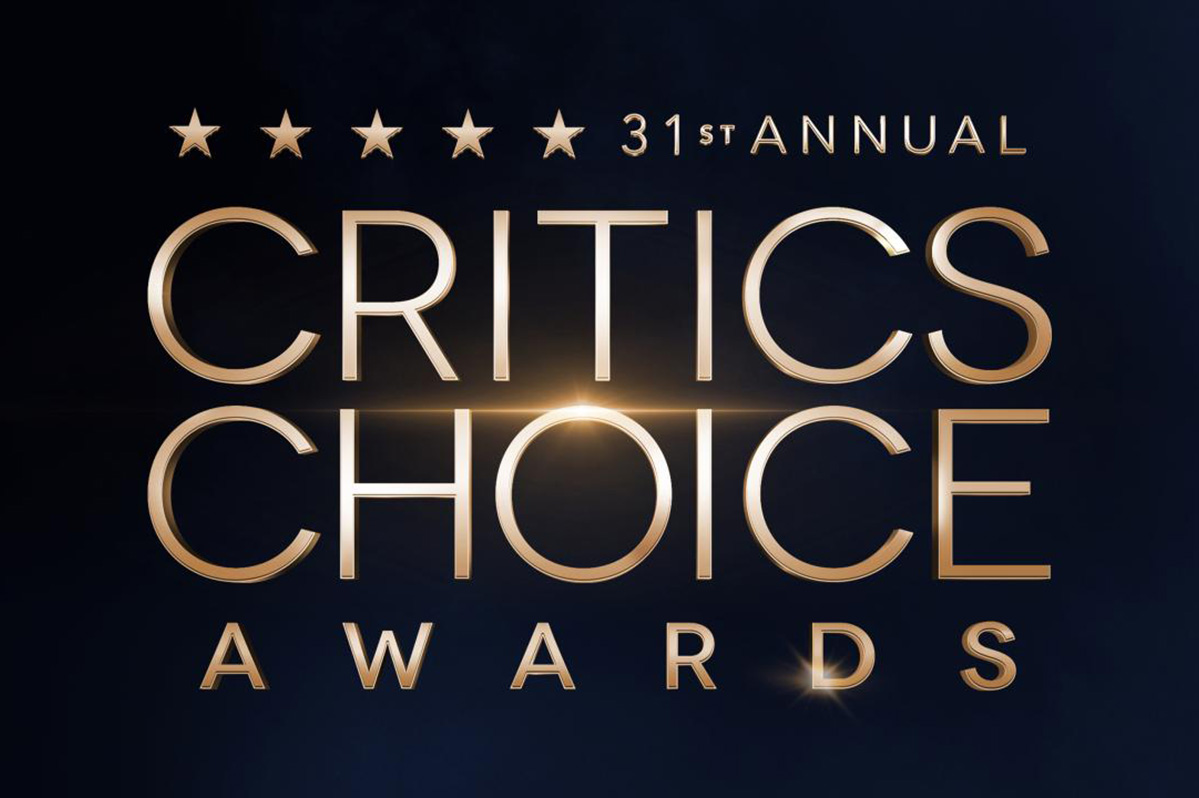
From Chelsea Handler shouting out Heated Rivalry in her opening monologue to Amy Madigan proving that horror performances can (and should) be taken seriously, the Critics Choice Awards provided plenty of iconic moments for queer movie fans to celebrate on the long road to Oscar night.
Handler kicked off the ceremony by recapping the biggest moments in pop culture last year, from Wicked: For Good to Sinners. She also made room to joke about the surprise hit TV sensation on everyone’s minds: “Shoutout to Heated Rivalry. Everyone loves it! Gay men love it, women love it, straight men who say they aren’t gay but work out at Equinox love it!”
The back-to-back wins for Jacob Elordi in Frankenstein and Amy Madigan in Weapons are notable, given the horror bias that awards voters typically have. Aunt Gladys instantly became a pop culture phenomenon within the LGBTQ+ community when Zach Cregger’s hit horror comedy released in August, but the thought that Madigan could be a serious awards contender for such a fun, out-there performance seemed improbable to most months ago. Now, considering the sheer amount of critics’ attention she’s received over the past month, there’s no denying she’s in the running for the Oscar.
“I really wasn’t expecting all of this because I thought people would like the movie, and I thought people would dig Gladys, but you love Gladys! I mean, it’s crazy,” Madigan said during her acceptance speech. “I get [sent] makeup tutorials and paintings. I even got one weird thing about how she’s a sex icon also, which I didn’t go too deep into that one.”
Over on the TV side, Rhea Seehorn won in the incredibly competitive best actress in a drama series category for her acclaimed performance as Carol in Pluribus, beating out the likes of Emmy winner Britt Lower for Severance, Carrie Coon for The White Lotus, and Bella Ramsey for The Last of Us. Pluribus, which was created by Breaking Bad’s showrunner Vince Gilligan, has been celebrated by audiences for its rich exploration of queer trauma and conversion therapy.
Jean Smart was Hack’s only win of the night, as Hannah Einbinder couldn’t repeat her Emmy victory in the supporting actress in a comedy series category against Janelle James, who nabbed a trophy for Abbott Elementary. Hacks lost the best comedy series award to The Studio, as it did at the Emmys in September. And in the limited series category, Erin Doherty repeated her Emmy success in supporting actress, joining in yet another Adolescence awards sweep.
As Oscar fans speculate on what these Critics Choice wins mean for future ceremonies, we have next week’s Golden Globes ceremony to look forward to on Jan. 11.
a&e features
Looking back at the 10 biggest A&E stories of 2025
‘Wicked,’ Lady Gaga’s new era, ‘Sexy’ Bailey and more
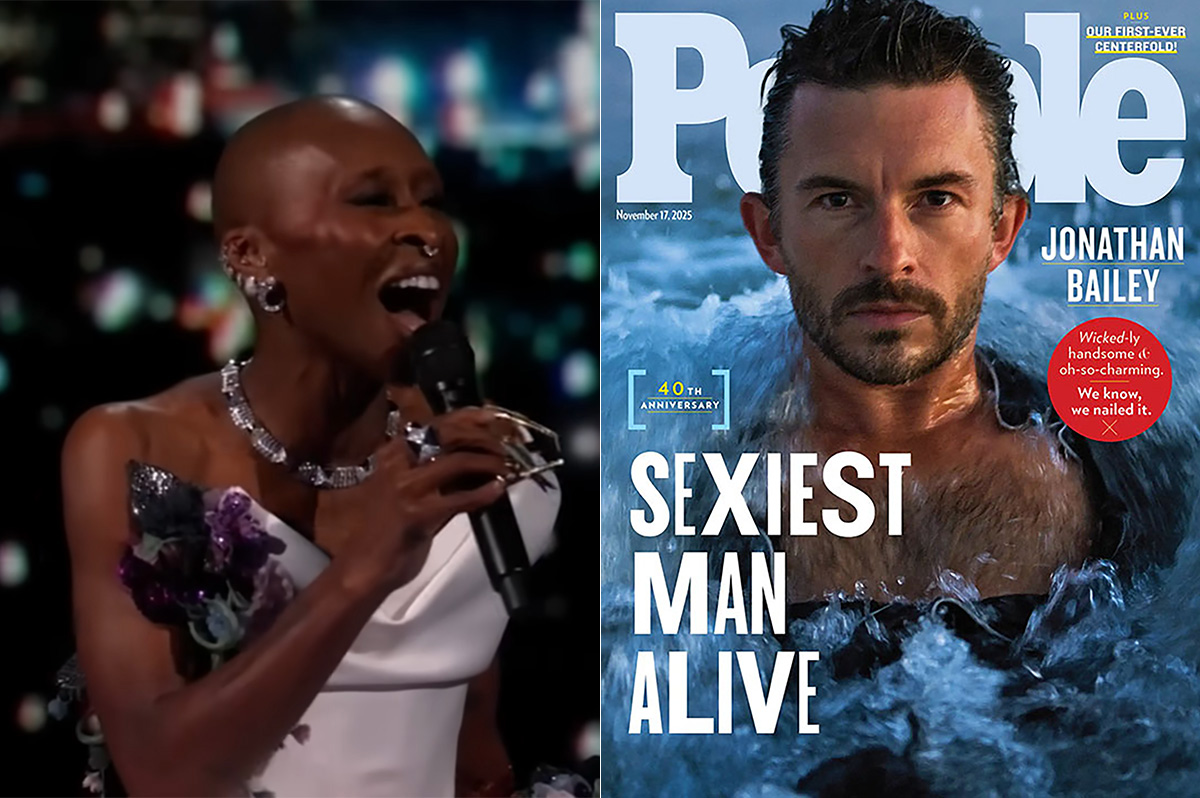
Although 2025 was a year marked by countless attacks on trans rights and political setbacks, the year also saw brilliant queer artists continuing to create art. From Cannes and Sundance Award winners now vying for Oscar consideration to pop icons entering new stages of their careers, queer people persevered to tell their stories through different media.
With the state of the world so uncertain, perhaps there’s no more vital time to celebrate our wins, as seen through some of this year’s top pop culture moments. While there’s no collection of 10 stories that fully encompass “the most important” news, here are some events that got the gays going:
10. ‘Mysterious Gaze of the Flamingo’ wins big at Cannes
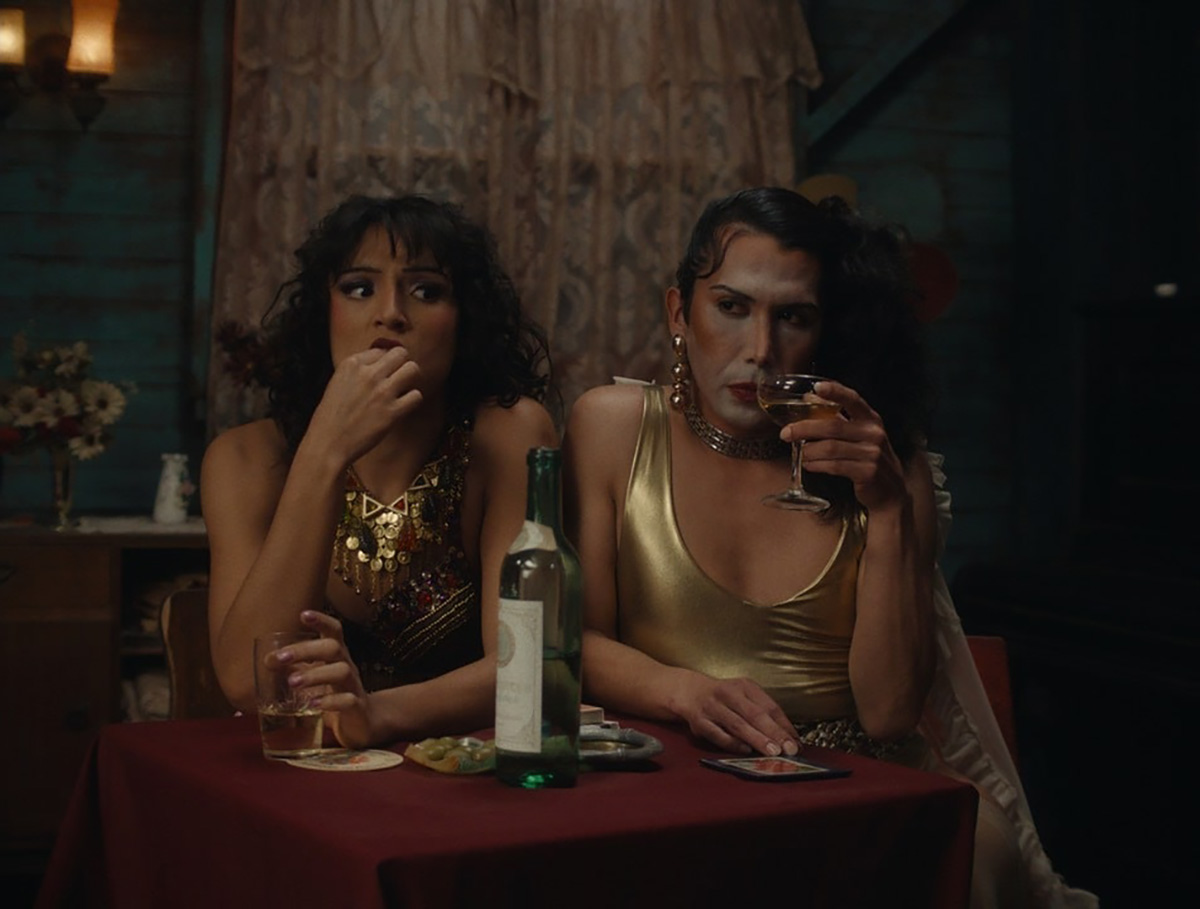
The Cannes Film Festival has become a crucial start for films hoping to make their way to the Oscars, and first-time director Diego Céspedes won the top Un Certain Regard prize for his intimate western “The Mysterious Gaze of the Flamingo.” The film is set in the ‘80s and is intended as an allegory for the AIDS epidemic. Seeing a film that unpacks vital queer history win one of the most coveted awards at Cannes has been a huge point of pride in the independent filmmaking community.
Since the film bowed at Cannes, it has been selected as Chile’s Oscar entry in the Best International Feature race. Speaking with The Blade during the film’s AFI Fest run in October, Céspedes said: At first, I was kind of scared to have this campaign position in the times that we’re living [in] here. But at the same time, I think the Oscars mean a huge platform — a huge platform for art and politics.”
9. ‘The Last of Us’ returns for an even gayer season 2
While the first season of The Last of Us gave us one of TV’s most heartbreaking queer love stories in the episode “Long, Long Time,” Season 2 doubled down on its commitment to queer storytelling with the blossoming relationship between Ellie (Bella Ramsey) and Dina (Isabela Merced). The show expanded on the pair’s relationship in the original video game, making it perhaps the central dynamic to the entire season. That unfortunately came with more homophobic backlash on the internet, but those who checked out all the episodes saw a tender relationship form amid the show’s post-apocalyptic, often violent backdrop. For their performance, Ramsey was once again nominated for an Emmy, but Merced deserved just as much awards attention.
8. ‘Emilia Pérez’ sparks controversy
Jacques Audiard’s genre-bending trans musical “Emilia Pérez” proved to be an awards season juggernaut this time last year, winning the Golden Globe for Best Musical/Comedy. But when the lead star Karla Sofia Gascón’s racist, sexist, and homophobic old tweets resurfaced, the film’s Oscar campaign became a tough sell, especially after Netflix had tried so hard to sell Emilia Pérez as the “progressive” film to vote for. Mind you, the film had already received significant backlash from LGBTQ+ audiences and the Mexican community for its stereotypical and reductive portrayals, but the Gascón controversy made what was originally just social media backlash impossible to ignore. The only person who seemed to come out of the whole debacle unscathed was Zoe Saldaña, who won the Oscar for Best Supporting Actress over Ariana Grande.
7. ‘Sorry, Baby’ establishes Eva Victor as major talent
Back in January at the Sundance Film Festival, Eva Victor (known by many for her brand of sketch comedy) premiered their directorial debut “Sorry, Baby” to rave reviews, even winning the Waldo Salt Screening Award. Victor shadowed Jane Schoenbrun on the set of “I Saw the TV Glow,” and seeing Victor come into their own and establish such a strong voice immediately made them one of independent cinema’s most exciting new voices. A memorable scene in the film sees the main character, Agnes (played by Victor), struggling to check a box for male or female, just one example of how naturally queerness is woven into the fabric of the story.
Most recently, Victor was nominated for a Golden Globe for her performance in the film, and she’s represented in a category alongside Jennifer Lawrence (“Die My Love”), Jessie Buckley (“Hamnet”), Julia Roberts (“After the Hunt”), Renate Reinsve (“Sentimental Value”) and Tessa Thompson (“Hedda”). The film also received four Independent Spirit Award nominations overall.
6. Paul Reubens comes out in posthumous doc
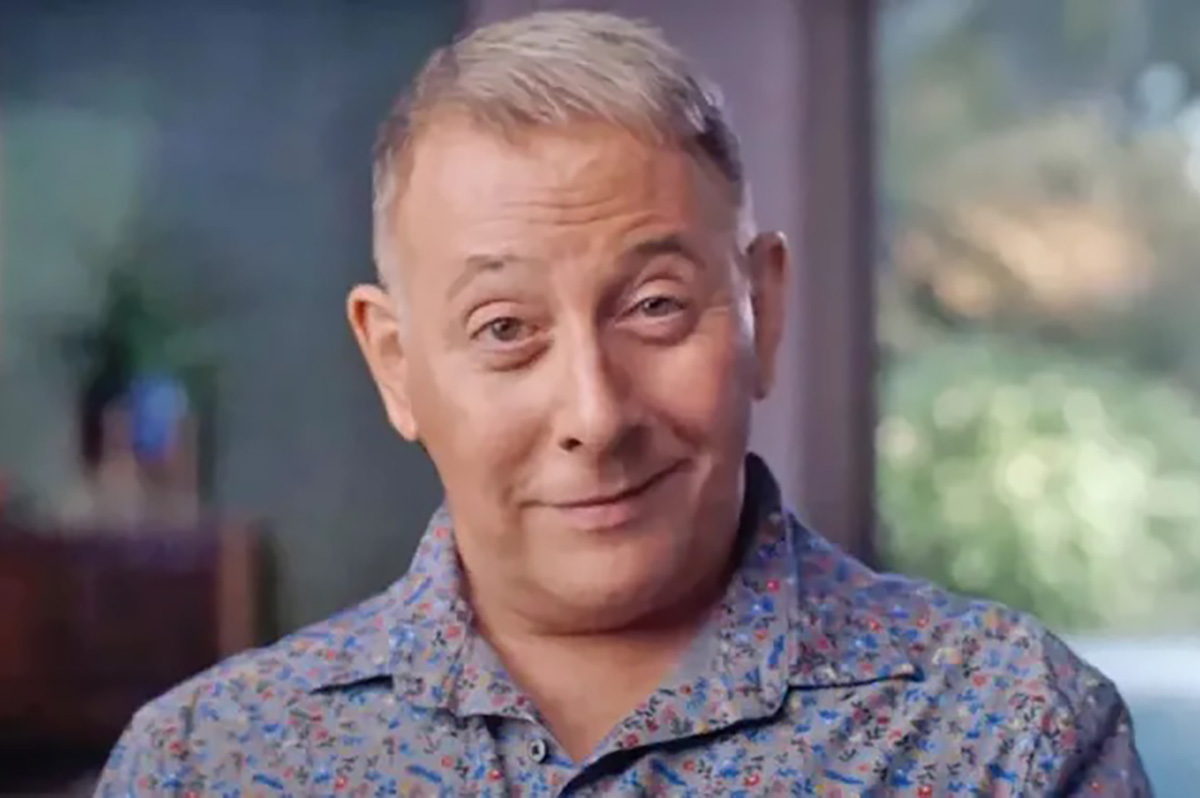
While Paul Reubens never publicly came out as gay before passing away in 2023, the two-part documentary “Pee-wee as Himself” premiered back in May on HBO Max, giving the legendary comedian a chance to posthumously open up to the world. Directed by Matt Wolf, the documentary explores how Reubens found his alter ego Pee-Wee Herman and why he kept his private life private.
The documentary won an Emmy in the Outstanding Documentary or Nonfiction Special category and remains one of the most critically acclaimed titles of the year with a 100% Rotten Tomatoes score. Also worth noting, the National Geographic documentary Sally told the posthumous coming out story of Sally Ride through the help of her long-time partner, Tam O’Shaughnessy.
5. Lady Gaga releases ‘Mayhem’
Lady Gaga entered a new phase of her musical career with the release of Mayhem, her seventh album to date. From the frenzy-inducing pop hit Abracadabra to the memorable Bruno Mars duet featured on “Die With a Smile,” seeing Gaga return to her roots and make an album for the most die-hard of fans was especially rewarding after the underwhelming film releases of “House of Gucci” and “Joker: Folie à Deux.” Gaga has been touring with The Mayhem Ball since July, her first arena tour since 2018. She even extended her tour into 2026 with more North American dates, so the party isn’t stopping anytime soon. And Gaga is even set to make an appearance next May in “The Devil Wears Prada 2.”
4. Cynthia Erivo, Ariana Grande perform at the Oscars
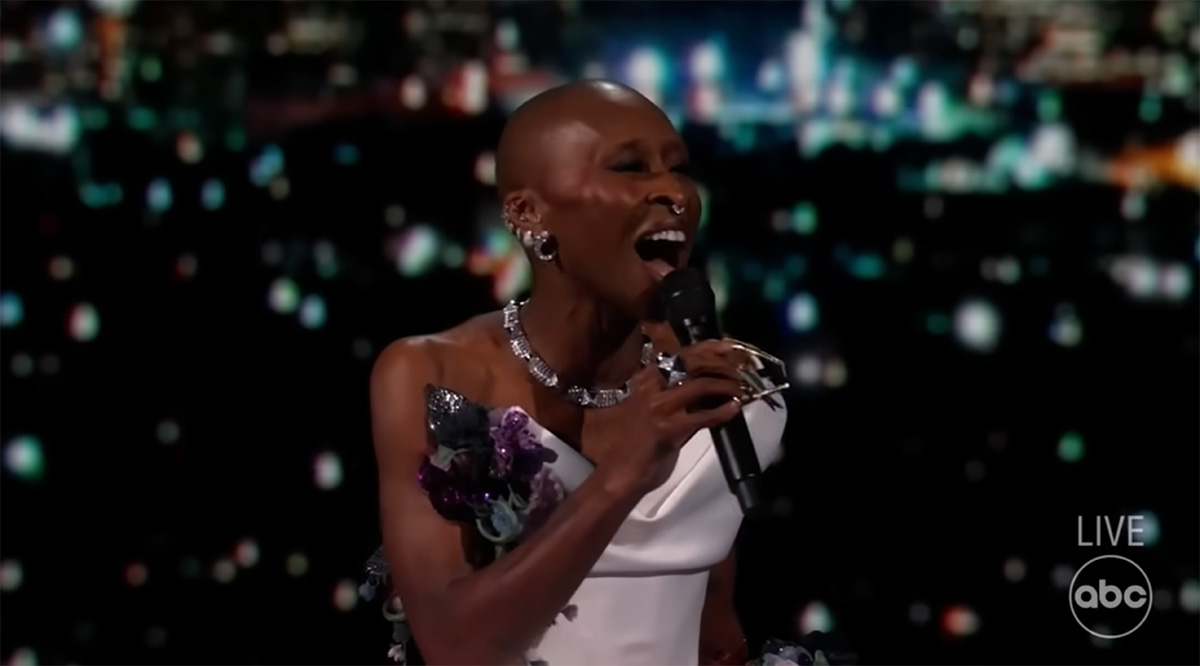
While “Wicked: For Good” didn’t quite reach the heights of the first film, we will forever have Cynthia Erivo and Ariana Grande’s breathtaking live performance that opened the 97th Academy Awards. The pair sang a rendition of “Over the Rainbow,” “Home,” and “Defying Gravity,” paying proper homage to the original 1939 “Wizard of Oz.” Even non-Wicked fans can’t deny how magical and brilliantly staged this performance was. With both Erivo and Grande up for acting Oscars last year, they’re hoping to repeat success and make history with consecutive nominations. Either way, let’s hope there’s another live performance in the making, especially with two new original songs (The Girl in the Bubble and No Place Like Home) in the mix.
3. Indya Moore speaks out against Ryan Murphy
Indya Moore has consistently used social media as a platform for activism, and in September, posted a 30-minute Instagram live speaking out against “Pose” co-creator Ryan Murphy. Moore claimed that Murphy wasn’t being a true activist for trans people. “Ryan Murphy, we need you to do more. You need to address the racism, the violence, and the targeting of people on your productions, Ryan Murphy. You do need to make sure trans people are paid equally. Yes, Janet did the right thing,” Moore said. Murphy was also back in the headlines this year for the critically panned “All’s Fair” and the controversial “Monster: The Ed Gein Story” starring Laurie Metcalf and Charlie Hunnam.
2. Cole Escola wins Tony for Best Leading Actor
Few pop culture moments this year brought us together more than Cole Escola winning a Tony award for “Oh, Mary!” the Broadway show they created, wrote and starred in (we love a triple threat!) Escola made history by becoming the first nonbinary person to win a Tony in the leading actor category, and seeing them excitedly rush to the stage wearing a Bernadette Peters-inspired gown instantly became a viral social media moment.
The cherry on top of Escola’s major moment is the recent news that they are writing a Miss Piggy movie with Jennifer Lawrence and Emma Stone producing — news that also broke the internet for the better. We cannot wait!
1. Jonathan Bailey makes gay history as ‘Sexiest Man Alive’
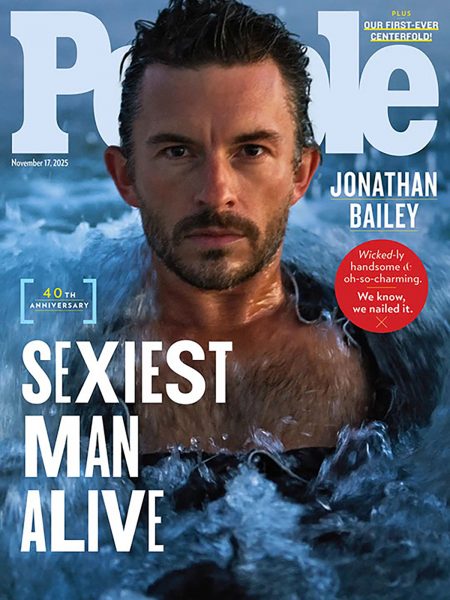
The same year as his on-screen roles in blockbusters “Jurassic World Rebirth” and “Wicked: For Good,” Jonathan Bailey made history as the first openly gay man to be named People magazine’s “Sexiest Man Alive.” The fact that it took 40 years for an openly gay man to earn the title is a signifier of how far we still have to go with queer representation, and seeing Bailey celebrated is just one small step in the right direction.
“There’s so many people that want to do brilliant stuff who feel like they can’t,” he told PEOPLE, “and I know the LGBT sector is under immense threat at the moment. So it’s been amazing to meet people who have the expertise and see potential that I could have only dreamed of.” In 2024, Bailey founded the charity titled The Shameless Fund, which raises money for LGBTQ+ organizations.
a&e features
Your guide to D.C.’s queer New Year’s Eve parties
Ring in 2026 with drag, leather, Champagne, and more
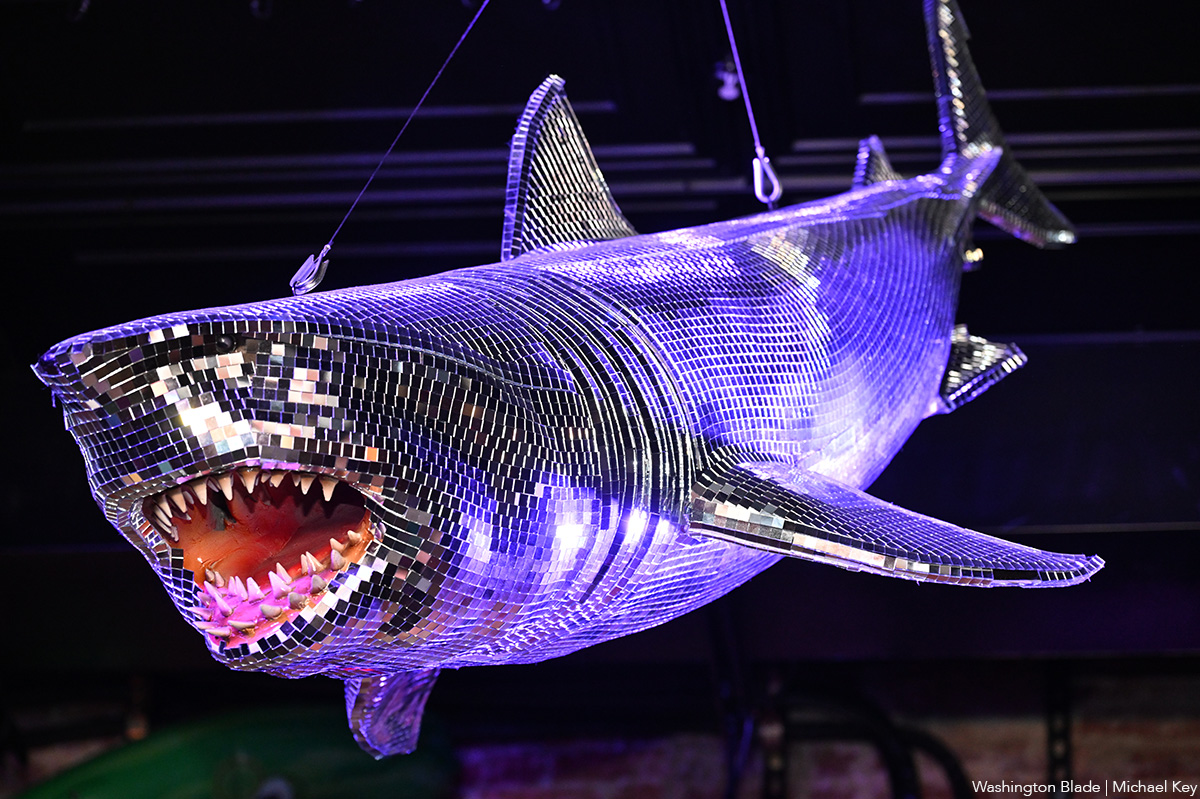
With Christmas in the rear view mirror, we can turn our attention to ringing in a much-anticipated New Year with a slew of local LGBTQ parties. Here’s what’s on tap.
Pitchers
This spacious Adams Morgan bar is hosting the “Pitchers’ Perfect New Year’s Eve.” There will be a midnight Champagne toast, the ball drop on the big screens, and no cover, all night long. The bar doesn’t close until 4 a.m., and the kitchen will be open late (though not until close). All five floors will be open for the party, and party favors are promised.
Trade
D.C.’s hottest bar/club combo is leaning into the Shark motif with its NYE party, “Feeding Frenzy.” The party is a “glitterati-infused Naughty-cal New Year’s Even in the Shark Tank, where the boats are churning and the sharks are circling.” Trade also boasts no cover charge, with doors opening at 5 p.m. and the aforementioned Shark Tank opening at 9 p.m.. Four DJs will be spread across the two spaces; midnight hostess is played by Vagenesis and the two sea sirens sensuously calling are Anathema and Justin Williams.
Number Nine
While Trade will have two DJs as part of one party, Number Nine will host two separate parties, one on each floor. The first floor is classic Number Nine, a more casual-style event with the countdown on TVs and a Champagne midnight toast. There will be no cover and doors open at 5 p.m. Upstairs will be hosted by Capital Sapphics for its second annual NYE gathering. Tickets (about $50) include a midnight Champagne toast, curated drink menu, sapphic DJ set by Rijak, and tarot readings by Yooji.
Crush
Crush will kick off NYE with a free drag bingo at 8 p.m. for the early birds. Post-bingo, there will be a cover for the rest of the evening, featuring two DJs. The cover ($20 limited pre-sale that includes line skip until 11 p.m.; $25 at the door after 9 p.m.) includes one free N/A or Crush, a Champagne toast, and party favors (“the legal kind”). More details on Eventbrite.
Bunker
This subterranean lair is hosting a NYE party entitled “Frosted & Fur: Aspen After Dark New Year’s Eve Celebration.” Arriety from Rupaul Season 15 is set to host, with International DJ Alex Lo. Doors open at 9 p.m. and close at 3 p.m.; there is a midnight Champagne toast. Cover is $25, plus an optional $99 all-you-can-drink package.
District Eagle
This leather-focused bar is hosting “Bulge” for its NYE party. Each District Eagle floor will have its own music and vibe. Doors run from 7 p.m.-3 a.m. and cover is $15. There will be a Champagne toast at midnight, as well as drink specials during the event.
Kiki, Shakiki
Kiki and its new sister bar program Shakiki (in the old Shakers space) will have the same type of party on New Year’s Eve. Both bars open their doors at 5 p.m. and stay open until closing time. Both will offer a Champagne toast at midnight. At Kiki, DJ Vodkatrina will play; at Shakiki, it’ll be DJ Alex Love. Kiki keeps the party going on New Year’s Day, opening at 2 p.m., to celebrate Kiki’s fourth anniversary. There will be a drag show at 6 p.m. and an early 2000s dance party 4-8 p.m.
Spark
This bar and its new menu of alcoholic and twin N/A drinks will host a NYE party with music by DJ Emerald Fox. Given this menu, there will be a complimentary toast at midnight, guests can choose either sparkling wine with or without alcohol. No cover, but Spark is also offering optional wristbands at the door for $35 open bar 11 p.m.-1 a.m. (mid-shelf liquor & all NA drinks).

